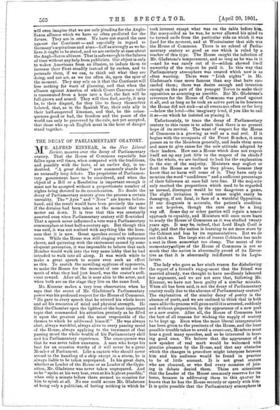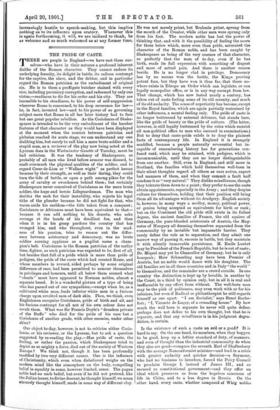THE DECAY OF PARLIAMENTARY ORATORY.
MR. ALFRED KINNEAR, in the New Liberal Review, mourns over the decay of Parliamentary oratory. That the House of Commons especially has fallen upon evil times, when compared with the traditions, and possibly with the facts, of an earlier day, is un- doubted. "A great debate" now commonly stands for an unusually long debate. The proprieties of Parliamen- tary government have to be considered, and when the object of a Bill or a Resolution is important enough it must not be accepted without a proportionate number of nights being devoted to its consideration. No doubt the _decay of Parliamentary oratory gives the process a certain unreality. The " Ayes " and " Noes " are known before- hand, and the result would have been precisely the same if the division had been taken at the moment that the mover sat down. It is true that this was constantly .asserted even when Parliamentary oratory still flourished That a speech never influenced a vote was a Parliamentary commonplace at least half-a-century ago. But though this was said, it was not realised with anything like the keen- ness that it is now. Great speeches seemed to influence votes. While the House was still ringing with rapturous cheers, and quivering with the excitement caused by some eloquent peroration, it was impossible to believe that each Member would walk into the very same lobby that he bad intended to walk into all along. It was worth while to make a great speech to secure even such an effect as this. To snatch the unwilling applause of opponents, to make the House for the moment of one mind on the merit of what they bad just heard, was the orator's suffi- cient reward. After all, he is near akin to the actor, and when both are on the stage they live on the same food.
Mr. Kinnear makes a very true observation when he says that the secret of Mr. Gladstone's Parliamentary power was his profound respect for the House of Commons. " He gave to every speech that he uttered his whole heart and all his resources of mind and physical strength. He filled the Chamber upon the lightest or the least important topic that commanded his attention precisely as he filled it upon the greatest and the most responsible of the themes to which he addressed himself." He was always alert, always watchful, always alive to every passing mood of the House, always applying to the treatment of that passing mood the whole wealth of his Parliamentary skill and his Parliamentary experience. The consequence was that he was never taken unawares. A man who keeps his best for an occasion worthy of it will never be a great Member of Parliament. Like a captain who should never attend to the handling of a ship except in a storm, he is always liable to be taken unprepared. In his great days, whether as Leader of the House or as Leader of the Oppo- sition, Mr. Gladstone was never taken unprepared. And so he " spoke at his very best, even at his highest possible," when only a. minute before there seemed no occasion for him to speak at all. No one could accuse Mr. Gladstone of being only a politician, of having nothing in which he took interest except what was on the table before him. But many-sided as he was, be never allowed his mind to be turned aside from the particular side on which it was fixed for the moment, and at Westminster that side was the House of Commons. There is no school of Thalia-. mentary oratory so good as one which is ruled by a teacher of this type. The House caught the infection of Mr. Gladstone's temperament, and so long as he was in it —and he was rarely out of it—seldom showed itself unworthy of the respect he paid it. In this way that Parliamentary atmosphere was created which now is so often wanting. There were " Irish nights" in Mr. Gladstone's time more famous than any that have suc- ceeded them; there was desire enough and intention enough on the part of the younger Tories to make their opposition as annoying as possible. But Mr. Gladstone's reverence for the House of Commons was proof against it all, and as long as he took an active part in its business the House did not sink—at all events not often or for long —below the level—the imaginary level, if you like to call it so—on which he insisted on' lacing it.
Unfortunately, to trace the decay of Parliamentary oratory to this cause is to admit that there is no present hope of its revival. The want of respect for the House of Commons is a growing as well as a real evil. If it begins with the occupants of the Front Benches, it soon passes on to the Members generally, and leads them more and more to give cause for the new attitude adopted by their leaders. How can a House which does not respect itself set up any just title to the respect of its chiefs ? On the whole, we are inclined to look for the explanation in the size of the majority. Ministers may neglect or flout the House as much as they please, because they know that no harm will come of it. They have only to mention the word "confidence " and a sufficient percentage of their followers at once fall into line. If the majority only reached the proportions which used to be regarded as normal, disrespect would be too dangerous a game. The slight irritation it would cause might easily" be damaging, if not fatal, in face of a watchful Opposition. If our diagnosis is accurate, the patient's condition is not hopeless, though the cure may be a long way off. Some day or other parties will regain a nearer approach to equality, and Ministers will once more learn to study the House of Commons as it was studied twenty years ago. It maybe, indeed, that Lord Hugh Cecil is right, and that the nation is learning to set more store by the Cabinet and less by its representatives. But we do not think so. The large size of recent Cabinets has made a seat in them somewhat too cheap. The secret of the momentaryseclipse of the House of Commons is not so much that the nation is abnormally proud of its Execu- tive as that it is abnormally indifferent • to its Legis. lat ure.
• The lady who gave as her ninth reason for disbelieving the report of a friend's engagement that the friend was married already, was thought to have needlessly laboured her argument, and we are not sure that, following Mr. Kinnear, we have not been guilty of a similar mistake.
When all has been said, is not the decay of Parliamentary oratory really due to the absence of Parliamentary orators? The explanation of the similar decay of poetry is the absence of poets, and we are inclined to think that in both cases alike the process will goon until it is arrested, suddenly and without preparation, by the appearance of a new poet or a new orator. After all, the House of Commons has the best of all reasons for wishing the supply of oratory to he kept up. Even when the most liberal interpretation has been given to the' precincts of the House, and the least possible trouble taken to avoid a count-out, Members must hear a good many speeches, and so be interested in hear- ing good ones. We believe that the appearance of a new speaker of real mark would be welcomed with genuine pleasure by the House, and that any obstacles which the changes in procedure might interpose between him and his audience would be found in practice to be of little account. It is not great orators who are closured, or who find every occasion of join- ing in debate denied them. These are attentions that the Leader of the House commonly reserves for its bores, because in addressing them to this quarter he knows that he has the House secretly or openly with him. It is quite possible that the Parliamentary atmosphere is
increasingly hostile to speech-making, but this implies nothing as to its influence upon oratory. Whenever this is again forthcoming, it will, we are inclined to think, be as welcome and as much welcomed as at any former time.







































 Previous page
Previous page